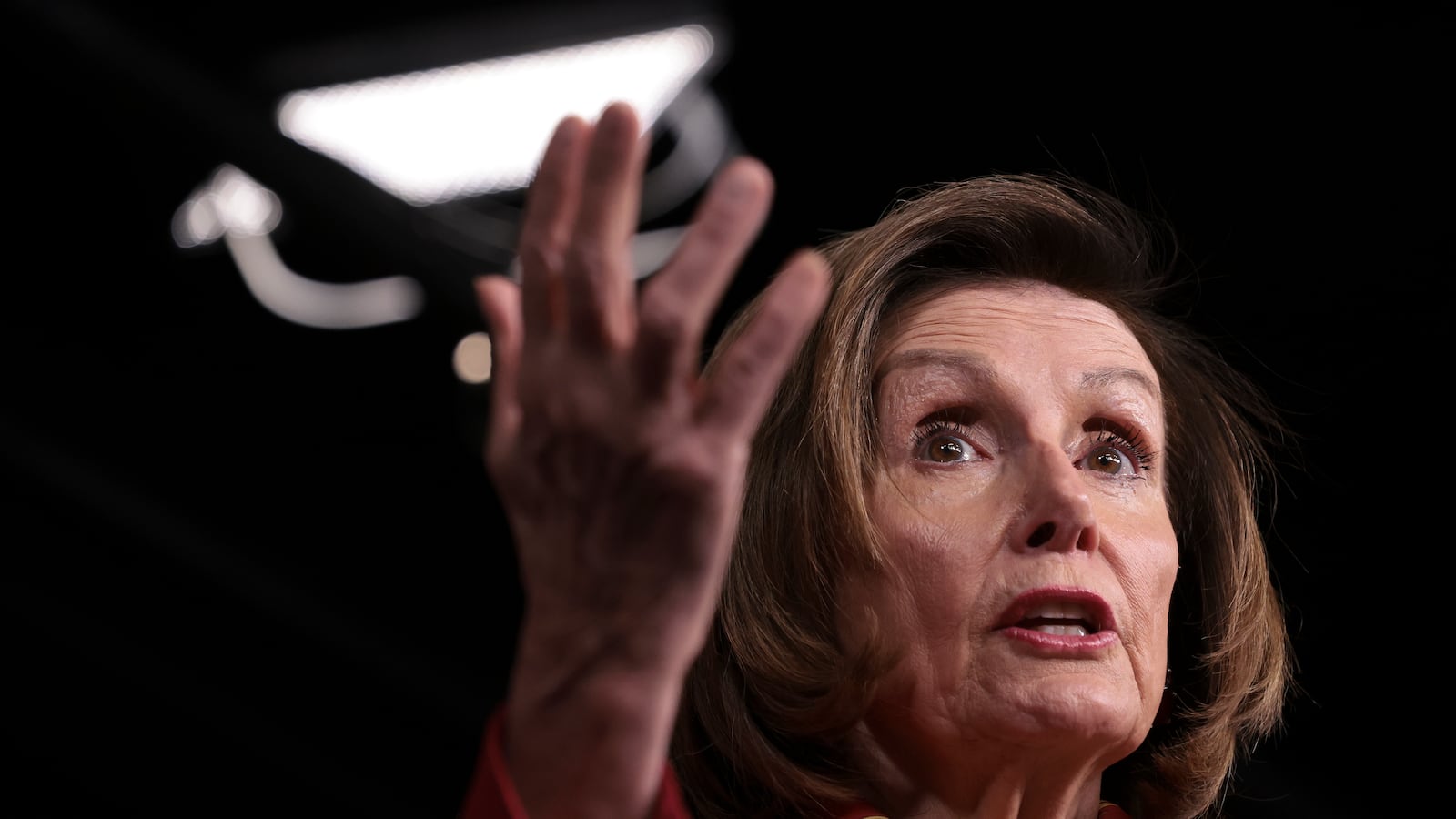With growing calls for Congress to ban its members from trading stocks, Speaker Nancy Pelosi—expected to announce support for new reforms—came before reporters on Wednesday and instead largely deflected questions about what, exactly, she is prepared to endorse.
The word from Punchbowl News’ morning newsletter was that Pelosi and House Democrats had “some big news”: They are “working on a ban on members of Congress and senior staff trading stocks.”
That may still be true, as Pelosi indicated Wednesday that Democrats were moving to “tighten the fines” for members who violate a stock disclosure act and to make financial reporting requirements “government-wide.”
“The Supreme Court has no disclosure,” Pelosi said. “It has no reporting of stock transactions, and it makes important decisions every day.”
But Pelosi stopped well short of endorsing a ban on members trading stocks—or even blessing more meager reforms—even as her Senate counterpart, Majority Leader Chuck Schumer (D-NY), came out in favor of a stock trading ban on Tuesday.
Instead, what Pelosi said was the House Administration Committee was reviewing “the options that members are putting forth.”
The Speaker said she, personally, believed in “the integrity of people in public service,” but was open to following the lead of members who are working on a final proposal to ban stock trading. “If that’s what members want to do, then that’s what we will do,” she said.
“What we’re trying to build is consensus,” Pelosi said. “Consensus.”
There’s already a fair bit of consensus on Capitol Hill—and in both parties—that at least some significant measures need to be taken to restore public trust in Congress. In recent years, a number of lawmakers have engaged in questionable trades, or failed to disclose them, raising questions about how their duties as federal lawmakers influenced their investment portfolios.
Pelosi’s press conference on Wednesday was so closely watched because she remained Capitol Hill’s highest-profile holdout.
The longtime House Democratic leader has become the face of a growing movement to ban members from trading stocks—but not in a good way.
First, Pelosi attracted some ire last year by defending lawmakers’ right to participate in the “free market.” Beyond that, her husband, Paul Pelosi, is a venture capitalist who actively trades and regularly beats the market. Together, Nancy and Paul Pelosi are estimated to be worth more than $100 million.
As websites have cropped up making it easier for individuals to replicate the stock trades of people like Paul Pelosi, the politics surrounding members trading stocks have become more fraught.
The issue has rocketed up to the top of the congressional agenda in 2022, with leaders like Schumer and House Minority Leader Kevin McCarthy (R-CA) backing reforms as well as dozens of rank and file members. A number of competing proposals exist in both the House and Senate, but all of them at least ban sitting lawmakers from buying or selling stock.
Even with Pelosi announcing that one of the House committees was looking at changes, that small movement is unlikely to be enough for many Democrats.
Rep. Abigail Spanberger (D-VA), told The Daily Beast on Wednesday she was “cautiously optimistic” about a path forward, but noted that Pelosi’s announcement amounted more to an acknowledgement “we’re going to talk about it more.” Spanberger said she was still waiting on more “positive indicators” for real progress.
Scrutiny on lawmakers’ investment activity exploded at the onset of the COVID pandemic, when news outlets—including The Daily Beast—reported on how a handful of lawmakers made advantageous trades after private briefings around the virus threat in early 2020.
The scandals, which prompted investigations by federal law enforcement and by the congressional Ethics Committees, ended up as major issues in the 2020 campaign—especially in the Georgia Senate runoffs. Both GOP senators from Georgia engaged in questionable stock trades, as The Daily Beast reported.
Lawmakers responded by proposing reforms—often on a bipartisan basis—but they moved slowly.
In 2020, Reps. Spanberger and Chip Roy (R-TX) introduced legislation requiring members of Congress to put any stock holdings in a blind trust. It was one of the first efforts drafted in response to the pandemic trades.
Their push, and continued media scrutiny on stock trading in Congress has kept the issue alive, but it’s unclear what action lawmakers might actually take—if they take action at all.
There are a raft of proposals now, some which go even further by banning members of Congress from owning stocks altogether while in office.
Spanberger said she did not have any details about how lawmakers will sort out the differences between those competing proposals to arrive at one bill. But she stressed the growing sentiment on Capitol Hill behind getting something done.
“Anything that we can do to just demonstrate that we want to be deserving of the trust that we're asking people to put in us, that's an important step forward,” Spanberger said.









